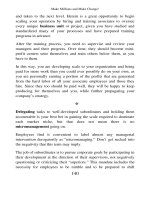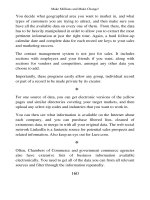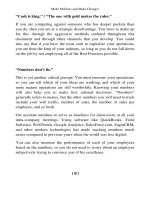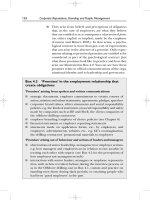Make Millions and Make Change 15
Bạn đang xem bản rút gọn của tài liệu. Xem và tải ngay bản đầy đủ của tài liệu tại đây (45.52 KB, 10 trang )
Make Millions and Make Change!
140
and taken to the next level. Herein is a great opportunity to begin
scaling your operation by hiring and training associates to oversee
every unique business unit or project, given you have studied and
standardized many of your processes and have prepared training
programs in advance.
After the training process, you need to supervise and review your
managers and their progress. Over time, they should become mini-
profit centers unto themselves and train others below them, as you
have to them.
In this way, you are developing scale to your organization and being
paid for more work than you could ever possibly do on your own, as
you are personally earning a portion of the profits that are generated
from the hard labor of all your associate employees and those they
hire. Since they too should be paid well, they will be happy to keep
producing for themselves and you, while further propagating your
company’s strategy.
Delegating tasks to well-developed subordinates and holding them
accountable is your best bet in gaining the scale required to dominate
each market niche, but that does not mean there is no
micromanagement going on.
Employees find it convenient to label almost any managerial
intervention derogatorily as “micromanaging.” Don’t get sucked into
the negativity that this term may imply.
The job of subordinates is to pursue corporate goals by participating in
their development at the direction of their supervisors, not negatively
questioning or criticizing their “superiors.” This mandate includes the
necessity for employees to be nimble and to be prepared to shift
Pick Pumped Up People
141
directions whenever current market data and momentum suggests it is
time. While you may be on the same team as your boss, he is held
accountable to shareholders and therefore has to make the final
decisions.
So if your boss wants to review the fine points of your corporate
initiatives, it is her right—more importantly, her duty— to understand
the details of the business and re-direct efforts whenever and however
she deems appropriate.
If this is labeled micromanaging, so be it. Successful companies
delegate and depend on as many employees as necessary to manage
and evolve every business segment independently, and to the best of
their abilities. At the same time, they have leaders who elicit
information from their ecosystem that form the basis to make fast,
educated decisions, which cannot always be perfect.
It may sound like a paradox to have a business that both delegates and
micromanages, but it is a matter of the areas to which each is applied
and the degree to which it is done.
Before you hire new staff, do the math: if you are trying to decide
whether you can hire five new people or not, consider how much extra
revenue they could bring in to your operation and if that will be
profitable.
If you have five new people who each bring in $300,000 per year, you
will then have an additional $1.5 million in revenue, which is almost
certainly profitable overall, and therefore worth their cost in salaries.
As much as we love employees, the real goal is for you to create as
many automated processes as possible to mix in with your hyper-
Make Millions and Make Change!
142
efficient, super-hard workers. Therefore, you would require fewer
employees to manage the more automated systems, and everyone
would benefit from splitting a bigger profit pie.
(Again, nobody said this was going to be easy.)
While we may try to break this process down piece by piece, the
overriding point is to work hard, have confidence and test lots of
ideas—try to get scale, leverage, and efficiency in order to raise your
revenues and profit margins.
With enough financial growth year after year and the beating down of
your competitors, you will have millions of dollars and be ready for
charity work in no time.
There is a well-known saying that goes “Hire the best, develop the
rest.” It is important to hire the smartest people, so they are in fact
trainable. Some of the most effective managers only hire a tiny
percentage of job applicants to ensure that they get the cream of the
crop.
Once you have hired the best people, make sure that you are
supportive and mature when reprimanding, not angry. On average,
punishment is counterproductive, so be careful when you are forced to
reprimand those who are not following your best plans and practices.
It is also important to provide clear job descriptions at the beginning of
the process as a means to reduce turnover. Starting with a higher
quality employee base will go a long way when you begin the
continuous process of delegating responsibilities.
Pick Pumped Up People
143
If a person does not really like their job or their pay, it is pointless to
waste time training them unless it is already clear that they are moving
in the right direction. The person who is being delegated the
responsibilities needs to “take ownership” of his tasks in order to make
the delegation process worthwhile.
When you are training new employees, try to use real-life case studies
and scenarios that they will deal with on a day-to-day basis. Also,
consider sending the public facing employees to a Dale Carnegie sales
training course or even Toastmasters. To train is to learn; that is why it
must be a daily process among your employees—and for you,
especially if you hope to train others.
Incentivize Everyone
Additionally, you should always make sure all of your teammates (co-
stakeholders) are properly incentivized to work hard and get ahead.
Contractors, business partners, industry partners, and the like should
feel that they are in the same financial boat as you and each other; as a
result, they will work better and harder for you and with you. If they
perform at an outstanding level, and that makes your company evolve
better and faster, then it makes sense for them to get extra pay.
In fact, you need your teammates to aspire to be high producers from
the start, so encouraging them with financial incentives is often the
most appropriate way to get the results that you require. There are
many ways to motivate someone, but the bottom line is to give
deserving parties extra money for outstanding performance.
Make Millions and Make Change!
144
Often, employees feel that they deserve extra pay, regardless of your
interpretation of their performance level. While you believe their base
pay is fair for the expected high level of work, they think they deserve
more even before the incentive plan is slated to kick in.
Get used to it; everyone always thinks that more is needed. Explain
your point of view so people understand what an incentive program is
supposed to do for the company and the program recipients. If the
program is vague or unrealistic, it will not serve its purpose.
The best choices for incentive-based programs include stock options,
phantom stock options (which pay the same amount as real options but
are easier to establish and have different management procedures),
cash bonuses based on revenue, cash based on profit, cash based on
sales volume, or cash based on hitting any other targets that you decide
are reasonable.
One way or another, it is important to encourage people to hit specific
benchmarks by offering them rewards for doing so.
Of course, you always reserve the right to award additional,
unexpected bonuses to employees who have performed beyond the
ordinary call of duty.
Unless you keep and disclose a reliable record of what other incentive
recipients have received in the past, your new incentive recipients
might have a hard time understanding what it takes to hit their
maximum upside.
Oftentimes, even you cannot be sure what the result of incentive plans
will be, and you may accidentally pay the person more, or less, than
you have anticipated.









